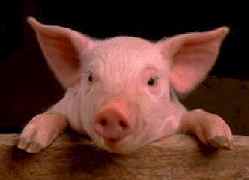Where Animal Cruelty and Folk Medicine Meet June 5, 2015
Author: Beach Combing | in : Modern , trackbackBritain’s glorious nineteenth century included many unsavoury episodes. But one of the more winsome aspects was the promotion by Britain’s London and southern provincial elite of the notion of cruelty to birds and to animals, the idea that animals and birds could feel pain and that the brute creation should be protected from its even more brutish masters. The laws voted in particularly those of 1839 and 1911 were revolutionary both in Britain and the world. However, there were also, along with a good deal of unintended consequences, clashes with traditional ways of caring for animals. This is an extraordinary case from 1893, as the defence argued the suspect had actually been cruel to his pigs, to save them from cruelty (at least in his own mind).
Mr. Edward Greening, farmer, of Cowley, near Oxford, was summoned before the county magistrates at Oxford, for cruelty to six pigs, by performing an illegal and unnecessary operation, on them. Inspector Jowett, of the Royal Society for the Prevention of Cruelty to Animals, said he saw the defendant and told him he had received a complaint with regard to what he had done to some of his pigs. Defendant said he had pegged the ears of his pigs by slitting them and putting a piece of boar’s-foot (a herb) in the hole. Defendant added that it was supposed to prevent the pigs having swine fever, and he had done it to scores of pigs in his father’s time. Witness said it might have boen tolerated years ago, but it was illegal now. The Chairman of the Bench (Dr. Child) said the case would be dismissed; in fact, the charge was not within the meaning of the Act at all. The Act was to prevent wanton and unnecessary cruelty. He believed that the defendant had made ‘a great mistake, and had performed an act unjustifiable and unnecessary, but his intention was not to do harm, but good, to the pigs. The case ought not to have been brought into court.’ Mr Hoskyns (a magistrate) wished to add that, in his opinion, the case had been unnecessarily ‘brought before the bench, and he did not believe there was any cruelty at all in the mere puncturing of the ear. The evidence had been strained so as to make wantonness a portion of the charge. He was surprised the inspector had brought such evidence in such a manner. lnspector Jowett said he was only acting on instructions from London. He asked if the magistrates would be willing to state a case if application should be made to them. Dr. Child: No, I think not.
Other examples of law getting the way of folk medicine: drbeachcombing AT yahoo DOT com



